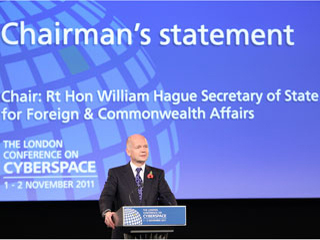
The Right Honourable Lord William Hague speaks at the London Conference on Cyberspace in 2011. At the time, Hague was the British Secretary of State for Foreign and Commonwealth Affairs. (Image courtesy of Chatham House on flickr. License CC BY.)
Instructor(s)
Prof. Nazli Choucri
MIT Course Number
17.445 / 17.446
As Taught In
Fall 2015
Level
Undergraduate / Graduate
Course Description
Course Features
Course Description
This course examines cyber dynamics and processes in international relations from different theoretical perspectives. It considers alternative theoretical and empirical frameworks consistent with characteristic features of cyberspace and emergent transformations at all levels of international interaction. Theories examined include realism and neorealism, institutionalism and liberalism, constructivism, and systems theory and lateral pressure. The course also highlights relevant features and proposes customized international relations theory for the cyber age.
Students taking the graduate version are expected to pursue the subject in greater depth through reading and individual research.


